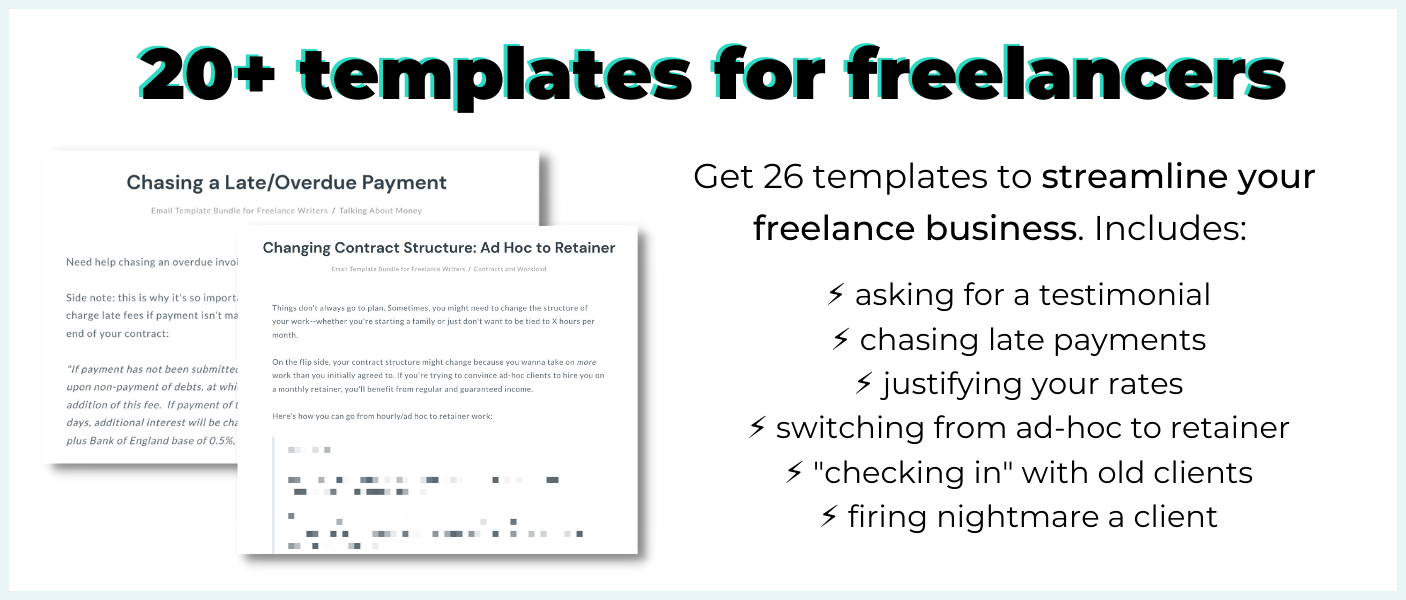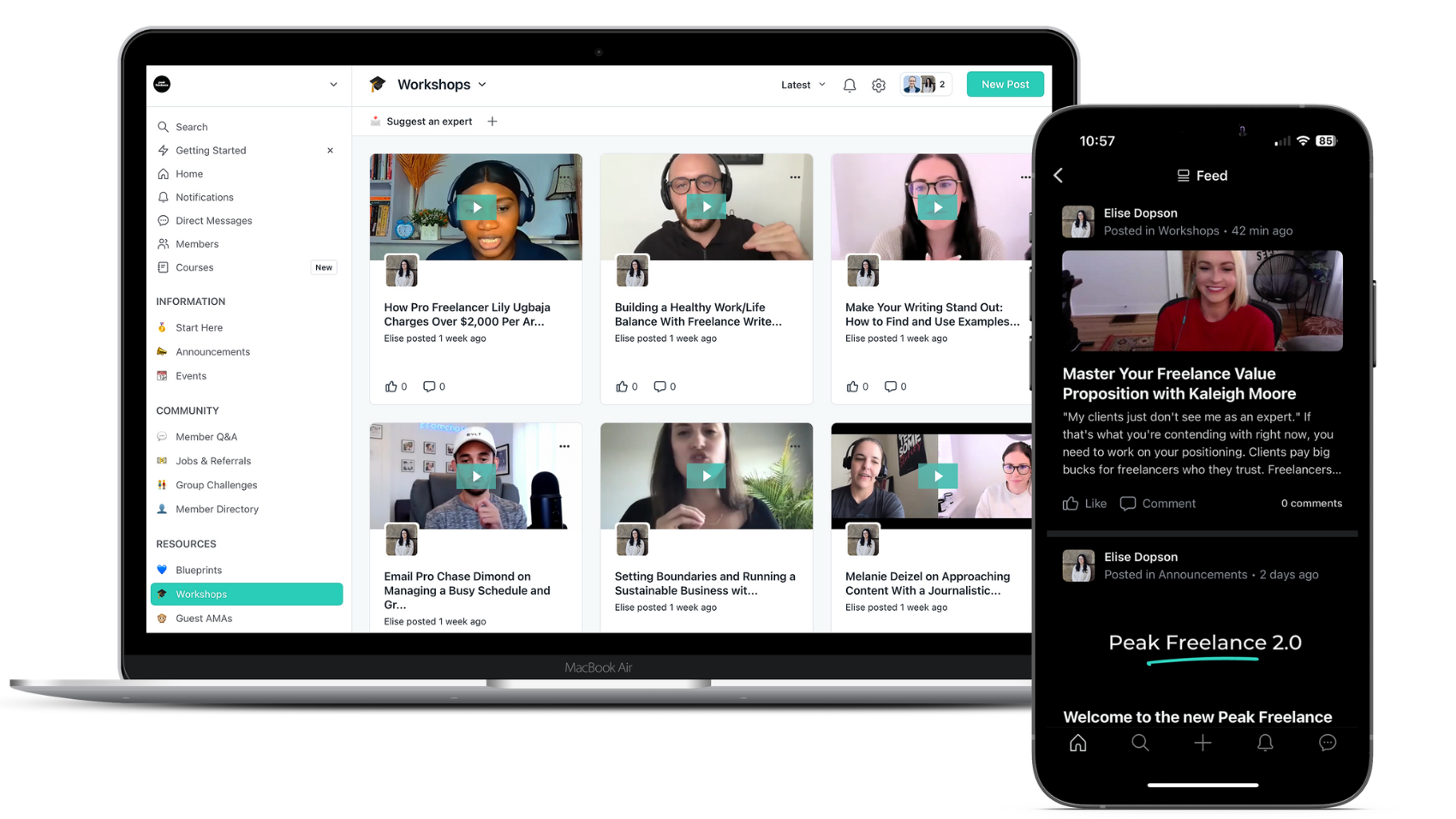Starting out as a freelancer can be nerve wracking. Besides figuring out what to write about and how much to charge, you may also struggle with finding recurring work. No one enjoys that feast-or-famine cycle of too much work one month and zero work the next month.
All the freelance writers who have a steady flow of work — or even a constant overflow — share one thing in common: they market themselves.
As a freelance writer for the last four years, I’ve tried several self-promotion tactics and seen which ones work and which fall flat. I’m here to share with you how to promote your freelance business without losing your mind.
These are my top 10 tips for promoting your freelance business. The goal of each of these tips is to have work come to you, instead of spending all your days hunting down work.
- Get active on social media
- Create a portfolio
- Show your expertise publicly
- Ask clients for referrals and testimonials
- Cold pitch your ideal clients
- Write guest posts
- Network
- Barter your services
- Join a freelance writing community
- Build your existing skills
1. Get active on social media
Would you believe it if I told you that I landed one of my highest paying long-term gigs by replying to a tweet?
Here’s what I did to take advantage of this opportunity:
- I put myself in line for the gig by following Allie in the first place.
- Once I nominated myself, I DM’ed her on Twitter telling her about my experience with SEO editing (I did not wait for her to reach out again).
- Guess what? I did not get that job, even though the team really liked my test edits. But because Allie saw my work in action, she referred me to another company who needed an SEO editor and they’re now my client.
That’s just one way social media can help you find paying clients. Two of my most effective social media networks for finding freelance writing gigs have been Twitter and LinkedIn.
To make my strategy work for you:
- Be proactive. Reach out and lead with your expertise, especially when the person has stated that they need a writer or editor with specific skills.
- Never make the prospective client do the legwork. Replying “I’m interested. How do I apply?” to a LinkedIn post or tweet is often a lazy approach. Send a DM if their DMs are open. With LinkedIn, you can click “connect” on a computer, not a mobile device, and then “add a note” (aka your cover letter). Once, I couldn’t message a LinkedIn prospect who’d posted a job opportunity, so I googled her. I found her website and emailed using the email address on the website. I’m currently writing an article for their site. So, you can waste time commenting “I can’t DM you” or you can do the legwork.
- Don’t be afraid to try again. Your initial contact may not bear fruit, but you’ll be on the client’s mind, and most people will reach out again in time if they liked your work.
If you’re reaching out to strangers, it’s important, of course, to have a social media profile that represents you well. What does that entail?
- Include relevant up-to-date information about what you do on your profile (not just random information about your hobbies and what you like to eat). Go on, sell yourself! Not enough characters? Make your pinned tweet all about your work and include a link to your portfolio or website.
- Actively participate professionally on at least one social media platform by posting, commenting on others posts, and sharing them as well. You can post about things you’re learning about your work, achievements you’re proud of, or resources that might benefit other freelancers.
- Connect with other writers by showing real interest in their work, tweets, and personal life (when they share). It’s tempting, but avoid only contacting or DM-ing when you need a favor, unless they’ve put out a call for writers or subcontractors. You can find writers to follow by Googling them after reading an article in a niche you want to write.
2. Create a portfolio
“But I don’t even have any clients yet!” I know, I know, but can you write? Then do it. If you’re not ready to invest in a website yet, publish articles on Medium or even Substack. I like websites because they can show off a variety of writing skills, from copywriting to landing page copy and blog writing. Plus, if you optimize your website for search engines, you can get leads from SEO without lifting a finger.
Now, when clients ask for clips, samples, or your portfolio, you have links that don’t lead to a Google Doc. Way more professional, if you ask me.
⚡️ Pro tip: Use Authory to pull content using your byline into an always-updated portfolio that clients can filter and sort.

3. Show your expertise publicly
The reason why it’s so hard for new writers to find work is that often, they have no proven expertise. You’re asking the client to take a chance on you.
Instead of placing that burden on them, show expertise by answering questions on Quora and then linking to your website, sharing what you’re learning on social media, or even displaying your editing skills with a clever grammar checker account like this Twitter user.
Your website can also be an opportunity to prove your SEO expertise or editing skills by writing how-to articles or creating tutorials that can rank on search engines. Remember, though, that with any kind of marketing — even marketing your freelance business — consistency is key.
Marketing whiz Joe Martin agrees.
If you want your site to find readers or your Twitter account to find followers, you need to keep at it. This is especially so with SEO efforts. SEO best practices take at least 6 months to bear fruit. So, don’t expect overnight results.
4. Ask for client referrals and testimonials
When you finally score those first couple of clients, before you close out the contract, ask for a review!
It helps to be specific, too. Lead the client to highlight what you’d like to emphasize. Is it the quality of your writing? The conversions your copy achieved? Or the fact that you never missed a deadline? Ask for it. You can use this template:
“It’s been such a pleasure working together. Would you be willing to write a brief testimonial about your experience working with me? I would love it if you could comment on the quality of the writing in my articles and what it accomplished for your brand.“
When you need a new client, it’s not an awful idea to email past clients to see how they’re doing — and remind them that you have availability. Here’s what I did in the past with someone in my network who connected me to a gig once.
Yes, they had an open role and I got the gig.
You can also ask current clients for new work. Just reach out to your contact and mention that you have availability and are wondering if they have additional content needs you can cover.
Ask, ask, ask! Closed mouths don’t get fed.
5. Cold pitch
Many freelance writers swear by cold pitching. I’ve had a couple of successful cold pitches, but I have to admit: I’m lazy about pitching, particularly since my writing schedule is almost always packed. Still, if you’re a brand new writer with a blog, a few articles in your portfolio, and plenty of free time, there’s no reason to shy away from pitching.
Here are some tips for making it work:
- Know the publication: Go through old articles to see what they typically write about, find a topic they would like but haven’t explored yet. To check if they’ve ever written about a topic, Google: [site:] [keyword].
- Pitch the right person: This is the tricky part. Often, you can track down the editor or content manager of a site on Twitter or LinkedIn. Sometimes you can also find them on the website About Us page.
- Keep it brief: Go straight to the point. Typically, 3-5 paragraphs explaining who you are and which topics you want to write about will do the job. Don’t forget to use a relevant email subject: “Freelance Pitch: [your subject].”
- Show your expertise: Highlight your experience in the email and leave links to specific articles in your portfolio — not just a link to your entire portfolio. That gives the busy editor more work to do.
- Do it A LOT: Like several times a day. It’s also okay to follow up with your pitches after a couple of weeks just in case they missed your email.
6. Guest blog
Guest blogging is a brilliant way to kill two birds with one stone. You’re building your portfolio and promoting yourself on a website that isn’t yours (which makes you even more “legit”). You can find guest blogging spots by Googling “[NICHE] guest blogging.”
Guest blogging can also lead you to your target client if you guest post on sites they frequent. That way, when they’ve read your excellent article and they see your headshot and bio linked to your website, they’ll be ready to inquire about your services.
I would recommend only sending or offering guest posts to sites that have accepted guest posts in the past and following their guidelines while at it. Otherwise, you’d be wasting valuable time. Guest posting may also mean — especially in the beginning — writing for free. Write about topics you would like to be paid to write. That way if a client stumbles on your work, you’ve already made your case.
After writing your blog post, sharing it with your network also gets the word out that you’re in the business of writing about a particular subject. Better still, guest posting can get you a spot as a paid, regular writer. That’s what happened to Elise Dopson when she pitched CoSchedule a free guest post.
Elise says, “They liked my writing style and could try me risk-free, so after it was published, they invited me to become a paid freelance writer for them.” Win-win!

7. IRL networking and word of mouth
Networking on social media is one thing, but real life (and virtual) events are another opportunity to meet other freelance writers and potential clients. If you’re trying to save costs, you can stick to events within your city.
Websites like Eventbrite and Meetup have freelance group events that might interest you. You can start by browsing this list of freelance events on Eventbrite. Peak Freelance also hosts monthly town halls which provide a chance to network with other freelancers — an invaluable potential source of referrals.
Another network to take advantage of is your real life contacts, such as family and friends. Tell them what you do and explain how your skills help brands and businesses. Whenever they’re considering starting a website or know anyone with content needs, you’ll be top of mind.

8. Barter your services
Another way to find exposure? Trade skills! If you have a friend who’s a photographer or website designer, you can offer to write their website copy, while they take headshots or design your site in return. They get credited on your site and vice-versa. You get a new portfolio item and a potential referral.
For example, freelance copywriter Kayla Hollatz partnered with her brother — who is a website designer — to create her website. He got to build his portfolio with a new client (Kayla) and she got a beautifully designed with hands-on creative input.
9. Join a community of freelancers
When I asked other freelancers on Twitter their #1 tip for promoting their business, finding a community was the recurring answer.
Content consultant and writer, Tiffany Regaudie responded that “being an active and valuable member of a few communities on Slack” has been helpful. Tiffany also mentions that she finds smaller communities more effective than larger ones.
Freelance writer Ilaria Mangiardi feels the same way about Facebook groups.
From personal experience, I know that finding a good community can be tough. Many groups though are just a bunch of freelancers promoting their work and asking for referrals. I was pleasantly surprised when I joined Peak Freelance.
With their membership, you also gain access to the following:
- An exclusive Slack community of writers from whom you can learn, connect with, and hear about available freelance roles
- Premium freelance writing resources like 25+ email templates for pitching, asking for testimonials, etc.
- Expert interviews with expert freelancers
- Monthly group calls to get direct feedback from the community on your work

10. Build on your existing skills
Having to pursue work can be draining and tough on your self-esteem and confidence as a freelancer. But don’t give up. As hard as it is to believe, this period is perfect for growth. Use it as a time for gaining new skills. Some of the most important freelance writing skills you can master right now are:
- Basic on-page SEO knowledge: Learn what it means to optimize content for search engines beyond keyword insertion. Websites like Ahrefs and Semrush can answer any questions on this topic.
- Self-editing skills: Improve your writing by taking writing courses, reading books, and learning to edit yourself before submitting work.
- Industry knowledge: Read articles by freelancers in the industry you’re interested in. This way, once you do get a client, you’re already familiar with the way your audience speaks and what kind of content works for them.
- Self-promotion: Especially if you’re shy or afraid to use your voice, you’ll need time to learn how to talk about your work on social media. This is also a great time to learn which platforms you can best harness for promoting your freelance business.
- Writing stamina: Writing regularly for your blog or Medium will make you a faster and better writer.
Other things you can work on right now are snagging useful certifications and building a network of fellow freelancers. All of these will come in handy when inevitably busy seasons come.
Start promoting your freelance business
Not sure where to start? Follow this order:
- Optimize your social media profiles (do it right now, I’ll wait)
- Join Peak Freelance
- Create a portfolio by writing on Medium or a personal blog
- Look for guest posting opportunities
- Start cold pitching!
You can do it! I’m rooting for you.


